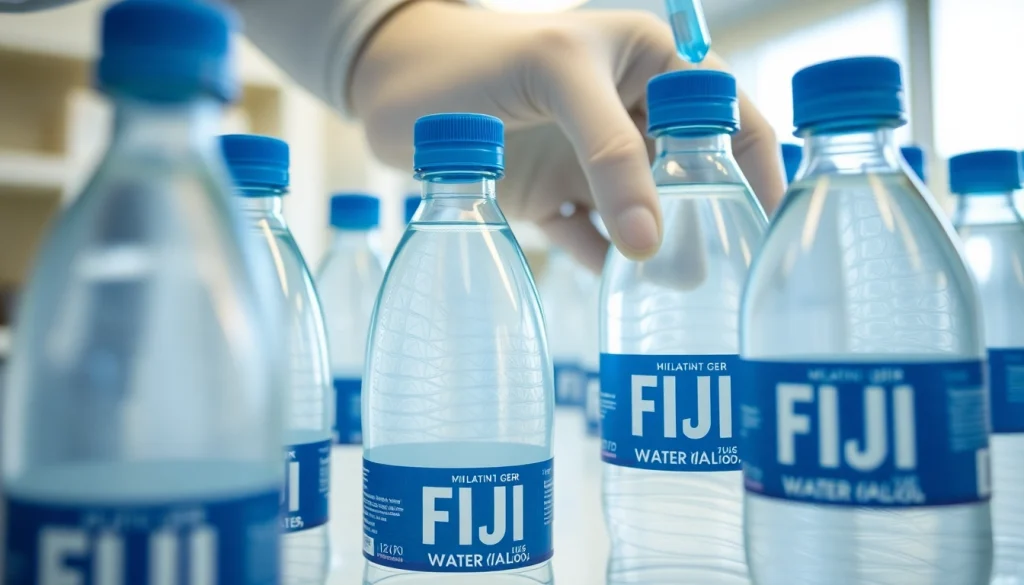Understanding the Fiji Water Recall
In recent months, fiji water bottles recalled has become a significant topic of concern for consumers and health experts alike. The U.S. Food and Drug Administration (FDA) announced the recall of approximately 78,533 cases of Fiji Natural Artesian Water—totaling nearly 1.9 million bottles—due to potential contamination with manganese and bacteria. This article delves into the specifics of the incident, its implications for consumers, the response from Fiji Water, and essential information on safe practices moving forward.
What Happened with Fiji Water Bottles?
The recall was initiated on May 23, 2024, following reports of the contaminated batches identified during routine testing. Specifically, certain lots of Fiji Natural Artesian Water were found to contain elevated levels of manganese, a mineral that, in excessive amounts, poses health risks. Additionally, the presence of bacteria was detected, further alarming both the FDA and consumers. The affected products were primarily distributed through online platforms, including Amazon, where they were purchased by countless individuals across the nation.
Reasons for the Recall: Manganese and Bacteria
Manganese is a mineral that is vital for human health but can be harmful in large amounts, leading to neurological and respiratory issues. The Minnesota Department of Health warns that susceptible populations—such as infants and individuals with liver conditions—are particularly at risk. Furthermore, the detected bacteria levels raised concerns regarding the potential for foodborne illnesses. This combination of chemical and biological hazards necessitated a swift recall to protect consumer health.
Official Statements from the FDA
The FDA’s official communication highlighted the seriousness of the situation. As a Class III recall, it indicated that while the contamination posed a remote chance of adverse health consequences, the potential risks were sufficient to warrant consumer warnings and product retrieval. Consumers were advised to stop using the product immediately, and the FDA assured the public that they were continuing to monitor the situation closely.
Impact of the Recall on Consumers
The repercussions of such a sizable recall extend far beyond immediate market ramifications. For consumers, the health risks associated with contaminated water are a primary concern, prompting extensive discussions about water safety and quality controls in the bottled water industry.
Health Risks Associated with Contaminated Water
Contaminated drinking water can lead to various health complications, ranging from gastrointestinal disorders to more severe neurological conditions, especially if exposure is chronic. Manganese, in particular, can accumulate over time, leading to serious conditions like manganism, which mimics Parkinson’s disease. In addition, bacterial contamination can introduce a host of pathogens, further complicating health outcomes.
How to Check If Your Bottles Are Affected
Consumers looking to determine if their Fiji Water bottles are part of the recall should check for specific product codes and lot numbers printed on the bottle’s label. The recalled products typically include Fiji 500 mL bottles sold in cases of 24. Websites of retailers and the FDA’s official recall list provide up-to-date information regarding the affected batches and how to locate this crucial information.
Recommendations for Safe Consumption
Safety should be the priority for consumers. If you suspect you have an affected product, refrain from consuming the water and dispose of it safely. It’s also advisable to stay informed about water quality in general, whether from bottled sources or tap. Drinking filtered water or water certified for purity and safety can offer peace of mind during such recalls.
Fiji Water’s Response and Remediation
In light of the recall, Fiji Water has taken proactive measures to address the contamination issues, reassure consumers, and improve product safety protocols moving forward.
Steps Taken by Fiji Water to Address the Issue
Fiji Water’s immediate response included initiating an internal review of their supply chain and quality control processes. The company is committed to transparency, frequently updating their consumers through press releases, social media, and direct communication regarding the recall and ongoing efforts to remediate the situation. This approach also included outreach to retailers to ensure that recalled products were removed from shelves promptly.
Product Testing and Quality Assurance Measures
Post-recall, Fiji Water has strengthened its product testing protocols by increasing both the frequency and comprehensiveness of quality checks. This includes testing for not just manganese and bacteria, but a broader spectrum of potential contaminants. The company’s collaboration with independent laboratories also aims to bolster consumer confidence by ensuring a higher level of scrutiny over their products.
Reassurance to Consumers Post-Recall
Fiji Water has taken steps to restore consumer trust by engaging with health experts and launching educational campaigns focusing on the importance of water safety. With the resumption of product sales, the company has pledged to keep consumers informed of their water quality through detailed labels and access to testing results whenever feasible.
How to Properly Dispose of Recalled Fiji Water Bottles
Proper disposal of recalled products, particularly food and beverage items, is critical to avoid further consumption and potential health risks.
Identifying Recalled Product Codes
Consumers must accurately identify the specific product codes associated with the recall. The FDA provides a list of affected codes, which can usually be found online. Bottles may be marked with batch numbers or sell-by dates that can help determine whether they are part of the recall. Keeping documentation, such as purchase receipts, can also assist in tracking affected products.
Safe Disposal Methods for Contaminated Bottles
For safe disposal, consumers should first ensure that the bottles are securely closed, preventing leaks. They can then follow local guidelines for hazardous waste disposal or regular waste disposal, depending on local regulations. It’s important to avoid recycling contaminated bottles to prevent any chance of reintroducing them into the market.
Alternatives to Fiji Water for Safe Hydration
While Fiji Water is celebrated for its taste and mineral content, consumers seeking alternatives during the recall period can explore various bottled and filtered waters. Options like spring water, mineral water with verified quality testing, and home filtration systems represent safe and reliable hydration methods. Brands with strong reputations for quality assurance may also provide peace of mind for consumers.
Frequently Asked Questions about the Recall
The recall has generated numerous inquiries from the public regarding the implications for product safety and personal health. Below are some common questions with detailed answers.
Which Specific Fiji Water Bottles Are Recalled?
The recall specifically affects nearly 1.9 million bottles of Fiji Natural Artesian Water. According to the FDA, the recall covers cases containing 500 mL bottles, emphasizing the importance of checking product details related to size and batch number to ensure accurate identification.
Are All Variants of Fiji Water Affected?
No, the recall is limited to specific batches of Fiji Natural Artesian Water. Other variants of Fiji Water, including those not included in the recalled lots, remain safe for consumption. However, consumers are encouraged to verify their product’s batch number against information provided in the recall notices.
What Should Consumers Do If They Have Recalled Water?
If consumers have recalled bottles, they should stop consuming the product immediately. They can return it to the place of purchase or dispose of it according to local disposal guidelines. Additionally, staying informed through official channels regarding updates and resumption of sales is critical.



